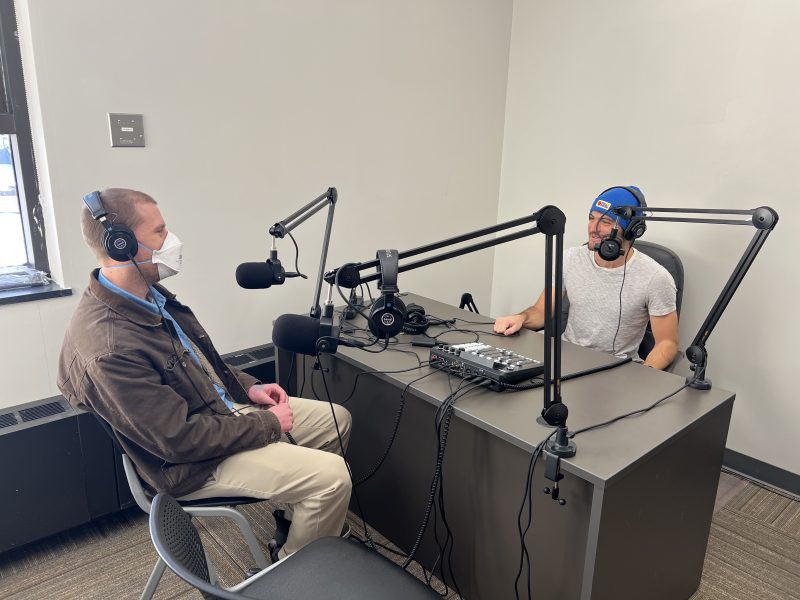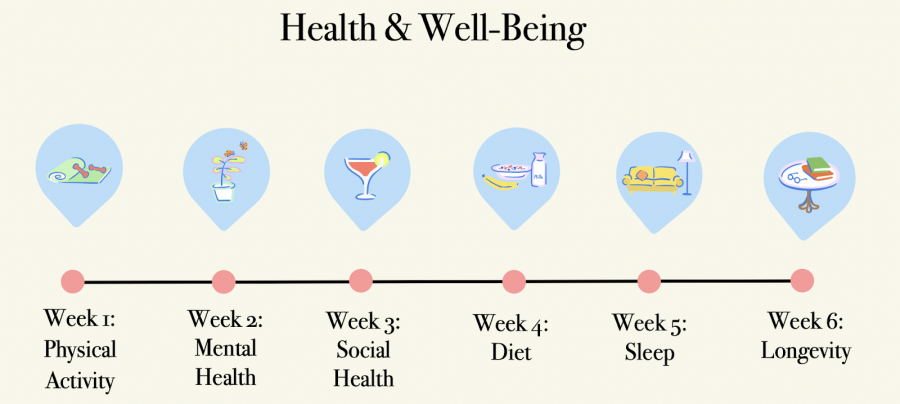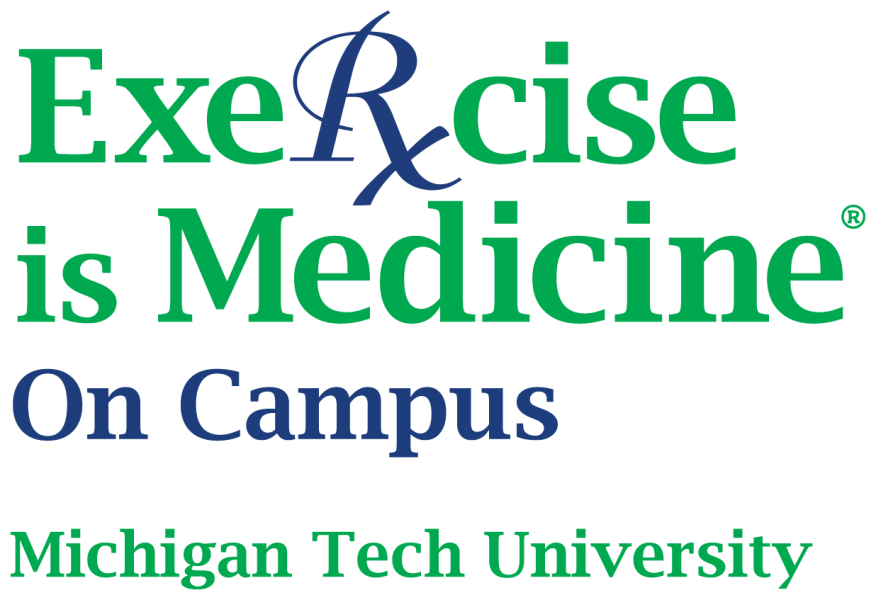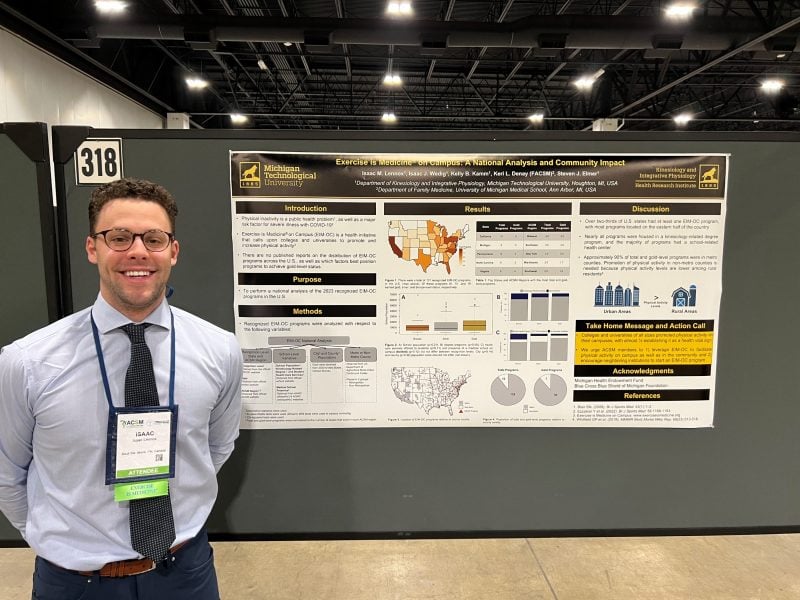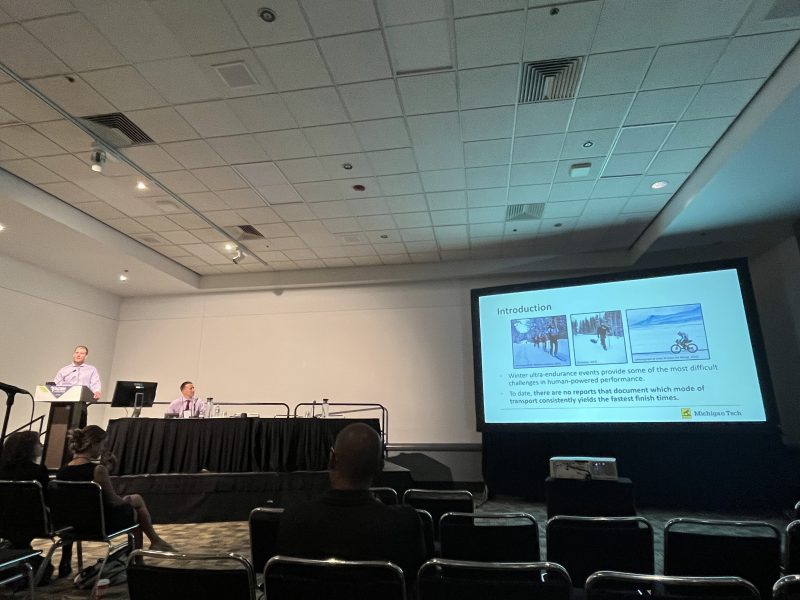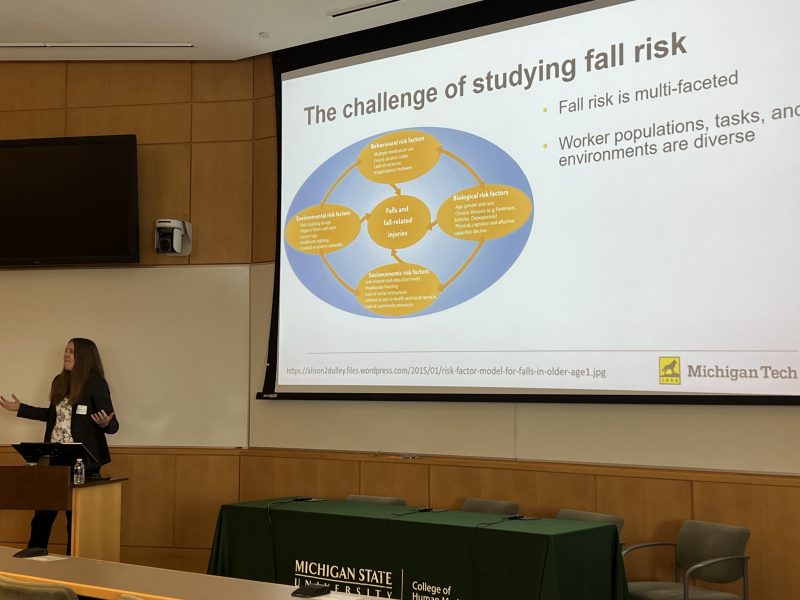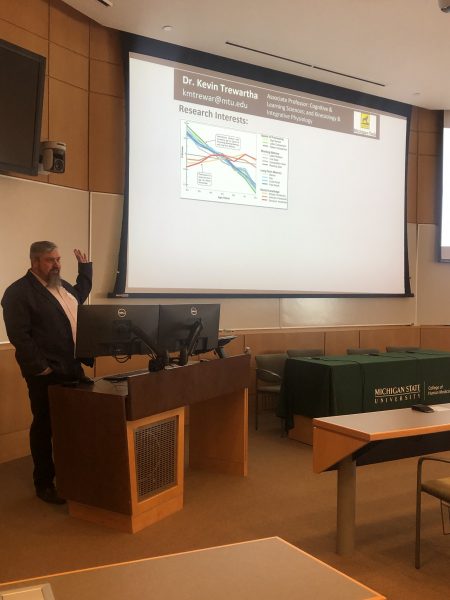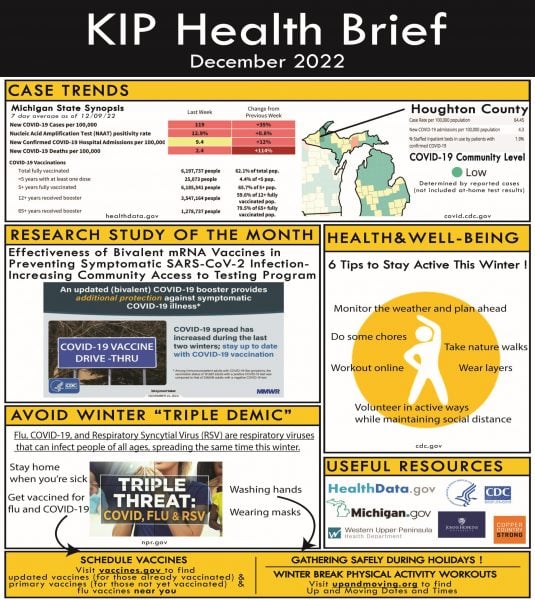Graduate students Kyle Wehmanen and Felix Cottet-Puinel discussed their recent publication in the Advances in Physiology Education titled “Impact of Health Behaviors on Community Well-Being and Resilience: Teaching K-12 Students with Jenga!” on the American Physiological Society (APS) Publications Podcast series. You can listen to the podcast on the APS Publications Podcast website.
Kelly Kamm (KIP) has been selected to serve on the Michigan Department of Health and Human Services’ (MDHHS’) Social Determinants of Health (SDOH) Hub Advisory Council.
Kamm, the Copper Shores Community Health Foundation Endowed Assistant Professor, focuses her research on understanding the determinants of health in young children and the elderly in rural populations, then works to develop and test interventions that improve health behaviors. She specializes in scalable, cost-effective interventions to improve health in communities with limited resources.
The advisory council’s work begins later this month. Kamm is eager to get started. “I’m excited to help represent the Upper Peninsula since social determinants of health play such a critical role in protecting and promoting health in our communities,” she said.
The SDOH Hub Advisory Council will guide the implementation of SDOH Hub pilot projects in communities across Michigan in 2024 and develop recommendations for future SDOH Hub initiatives.
According to the MDHHS, the pilot projects “bring community members, health care professionals, social service providers, government partners and business leaders together to address the social determinants of health and improve health equity.” Each pilot project will receive resources and technical assistance provided by MDHHS and contracted partners.
MDHHS said that over time, the Hub pilots’ aim is achieving “the overarching goal of the Roadmap to Healthy Communities: Improve the health and social outcomes of all Michigan residents while working to achieve health equity by eliminating disparities and barriers to social and economic opportunity.”
Visit the MDHHS’ SDOH Hubs page for more information on the program.
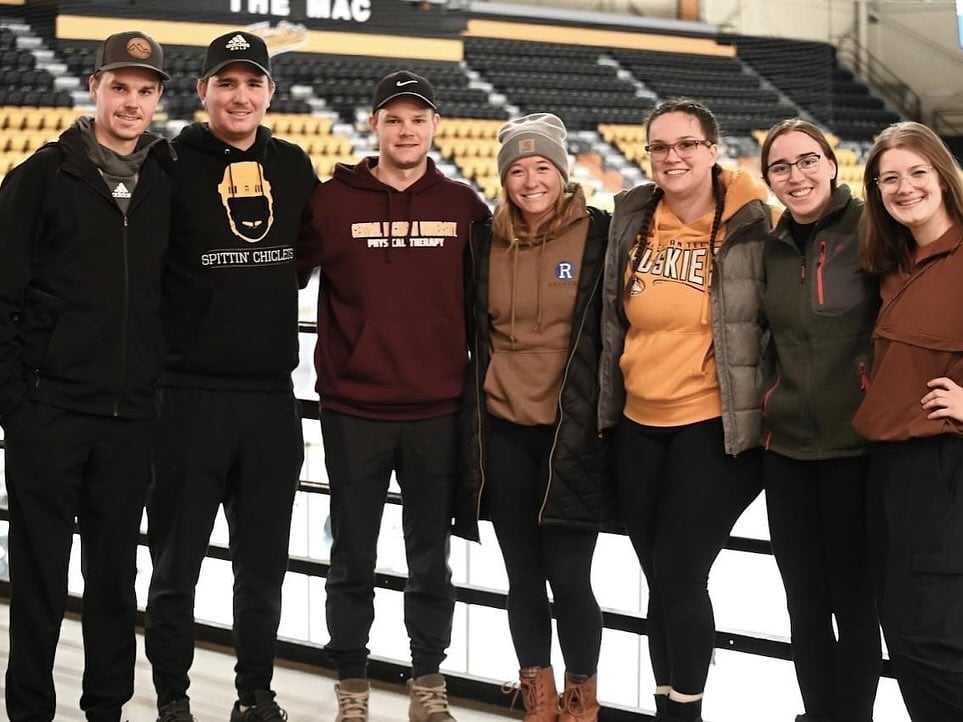
Central Michigan University doctorate of physical therapy students from the Houghton/Michigan Tech campus cohort volunteered for a community-wide sled hockey event in Houghton, MI earlier this month. Over 100 people came out to learn the sport of sled hockey, which is an inclusive way for people of any ability to get on the ice and play. The KIP department has been a sponsor of the event for the past two years.
Sled hockey entails sitting on a sled with two blades and propelling via picks on the ends of two short hockey sticks. Other than being in the sled, the rules are essentially the same as stand-up hockey. Students were essential in making the event a success, doing everything from running the registration table to assisting participants who tipped over in their sleds or pushing those who couldn’t self-propel. People with and without physical disabilities were able to play hockey together without barriers. The DPT students were amazingly helpful and gained valuable experience with adaptive sports. It was an incredibly fun day!
Background
Mental health and well-being is a well-documented concern in many settings, including school, work, and at home. Many individuals face depression, anxiety, eating disorders, substance abuse, and more. As graduate students in the Department of Kinesiology and Integrative Physiology, we believe that well-being is multifaceted and includes physical, mental, and emotional components. During his time in office, U.S. Surgeon General Dr. Vivek Murthy has raised several concerns related to mental health and well-being. Many of these relate to mental health. However, the U.S. Surgeon General seeks to remedy other concerns related to physical inactivity, health literacy, social media usage, and many other topics. A recent KIP blog post highlighted how the Surgeon General addresses the effects of loneliness and social isolation in individuals affecting overall health. Increased risk of dementia, cardiovascular disease, stroke, and mental illnesses are linked to increases in loneliness and social isolation. With guidance from the Surgeon General, these concerns will be addressed in this next series of blog posts. Our team read these advisory statements as a call to action, inspiring us to create a platform where our campus and community members can learn more about how to better their health and well-being.
Answering “The Call”
This series of blog posts will expand on the overarching theme of creating healthier habits and improving overall well-being, while also trying to promote health literacy by producing clear and concise information for all to view. The series will be broken down into six different posts that explore different aspects of health. These subsections will be defined as physical activity, mental health, social health, diet, sleep, and aging. Each segment will include an introduction to the topic, present relevant information and evidence, and provide simple recommendations that you can apply to your everyday life to improve your health and well-being. Our team is very passionate toward rural areas and rural health. This blog will aim to provide creative ways to improve the quality of life without the need for extensive resources. This blog will serve as a platform to share these ideas to improve our health and well-being in a comprehensive and accessible way. To complement this blog, information will be shared on the Michigan Tech KIP department’s social media pages (Facebook, Instagram, TikTok, and Youtube).
A Bit About Us and How We Want to Help You
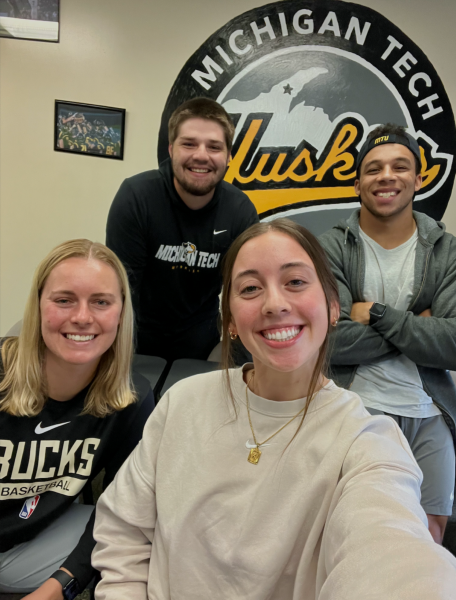
Our team consists of 4 Michigan Tech KIP Graduate Students. Kate Meister and Alex Rondorf are members of the Michigan Tech Women’s Basketball Team. Michael Bates and Blake Hewitt are members of the Tech Football Team. All of us are committed to ensuring a brighter future for a community we’ve been privileged to be a part of for the last several years. We all plan to pursue careers in healthcare/applied sports science and feel passionate about bringing you the latest and greatest information to ensure your overall well-being. We feel it’s important to advocate for a healthy lifestyle and want to present small steps that lead to big changes over time. This blog series will also help us refine our skills in science communication, which we are working on in Dr. Elmer’s KIP 5000 Advanced Exercise Physiology class this semester. Thank you for spending your time with us and we are excited to share our ideas and findings, as we embark on this journey to improve our health and well-being together.
Next Up
For the next post to be presented in this series, our first installment will provide an outlook on physical activity. We’ll talk about why physical activity is a necessary part of our daily lives, how much physical activity we really need, and how getting up and moving may actually save your life…
October is Exercise is Medicine® On Campus Month. As a Silver Level ACSM Exercise is a Medicine® recognized campus we want to engage our students, staff, and faculty this month. Below are 4 ways to participate, promote, and advocate for the importance of physical activity on our campus during October.
1. Sit less – take a short break from sitting which can be a lunchtime standing break activity from your desk, office, library, etc. This short 20 min low-intensity movement break will help everyone take a break from prolonged sitting.
2. Move a little more – get in your physical activity for the day Join us for a virtual physical activity workout on our UP & Moving website. These 30-45 min moderate intensity workouts offer a great way to work towards achieving the recommended amount of weekly physical activity of 150 minutes/week.
3. Encourage others to stay active; new research highlights the protective role physical activity has against COVID-19.
Here is a short blog post written by former graduate student Isaac Lennox highlighting the benefits of staying physical active to help reduce risk for COVID-19 infection, hospitalization, severe illness, and death.
4. Advocate for physical activity.
Department of Kinesiology and Integrative Physiology Proclamation
WHEREAS, October 2023 is Exercise is Medicine® On Campus Month; and WHEREAS, all Students, Staff, and Faculty are encouraged to speak with their health care provider about how physical activity and exercise may improve their personal health or help treat or prevent numerous chronic conditions, such as high blood pressure, cardiac disease and diabetes; and
WHEREAS, all health care providers are encouraged to talk to their patients about the health benefits of regular physical activity and to strongly recommend that their patients engage in appropriate exercise; and
WHEREAS, regular, moderate-intensity exercise has curative and protective health benefits; and WHEREAS, the health benefits of physical activity and exercise have the power to improve the quality of life for everyone; and
WHEREAS, a healthier populace means cost savings, greater participation in the workforce and other benefits to society at large; and
WHEREAS, regular physical activity and exercise is indeed a powerful prescription, with great potential to improve the health of all people everywhere; and
WHEREAS, the American College of Sports Medicine and Department of Kinesiology and Integrative Physiology at Michigan Tech University call on health care organizations, health care professionals, regardless of specialty, to assess, to advocate for, and to review every patient’s physical activity program during every comprehensive visit;
NOW, THEREFORE, I, William Cooke, PhD, Professor and Chair in the Department of Kinesiology and Integrative Physiology, hereby proclaim October 2023 as EXERCISE IS MEDICINE® ON CAMPUS MONTH
The Department of Kinesiology and Integrative Physiology encourages all STUDENTS/STAFF/FACULTY to participate in activities and observances relating to Exercise is Medicine® On Campus Month in the interests of better health and quality of life for all.
William Cooke, PhD, Chair of the Department of Kinesiology and Integrative Physiology DATED THIS 5th DAY OF OCTOBER, 2023
©2023 Exercise is Medicine®. All rights reserved.
Guest blog by: Suma Durga Bommasani, College of Computing graduate student
Humans are social creatures as we are wired to interact and connect with others. However, over time we have become more isolated. Loneliness has become a serious public health concern that affects people of all ages, genders, and socioeconomic backgrounds in the United States. A new advisory report by the United States Surgeon General titled “Our Epidemic of Loneliness and Isolation” has shed light on the severity of this problem, showing that loneliness has a higher incidence rate than common medical conditions like smoking, obesity, and diabetes. Even though social isolation and loneliness have a considerable impact on individual health and society, only 20% of people consider it to be a serious problem.
As described in the report, about 1 in 2 adults experience loneliness. Loneliness has been linked to a higher risk of dementia, as well as cardiovascular disease, stroke, and mental health conditions. With a higher-than-average proportion of older individuals, this issue is of particular concern for the Upper Peninsula of Michigan region. Additionally, social isolation and loneliness among children and adolescents, which accelerated during the COVID-19 pandemic, increases the risk of anxiety and depression.
Experts highlight the critical need to implement strategies to build social interactions and boost health, safety, and well-being, as social ties are a fundamental human need. To address this serious issue, a national strategy with six main pillars has been presented, with the goal of building an integrated approach to improving community and social connectivity.
Individuals can prioritize their personal well-being by staying in touch with a varied network of people, limiting their use of social media, obtaining professional guidance when necessary, and expressing gratitude to others. The Centers for Disease Control and Prevention “How Right Now” platform provides some helpful resources for people currently experiencing loneliness. Parents and caregivers can positively affect the lives of children and adolescents by actively engaging with them, highlighting the value of social connections, and monitoring online activity. Getting assistance from mental health and medical professionals can also help with the behavioral alterations connected to loneliness. Educators can build in social connection content to health curricula and help to foster a sense of belonging in the classroom. Local organizations and businesses also play an important role in establishing social connection by introducing programs that increase social contact and bring community members together.
We can all contribute to strengthening social connections. This basic toolkit from the National Institutes of Health has some great examples for improving your social health. Even something as simple as reaching out to a friend, family member, or neighbor to say hi or to invite them for a short walk can help. By coming together to address social disconnection and loneliness, we can work towards building healthier and stronger communities.
Federal Resources
U.S. Department of Health and Human Services
Our Epidemic of Loneliness Social Isolation
https://www.hhs.gov/sites/default/files/surgeon-general-social-connection-advisory.pdf
Centers for Disease Control and Prevention
“How Right Now” platform
https://www.cdc.gov/howrightnow/emotion/loneliness/index.html
National Institutes of Health
Social Wellness Toolkit
https://www.nih.gov/health-information/social-wellness-toolkit
Campus Resources
Michigan Tech University Center for Student Mental Health
The Center for Student Mental Health and Well-being provides a wide array of resources for students to ensure mental and physical well-being.
National Resources
American Psychological Association (APA)
APA provides resources on workplace well-being, stress management, and mental health
American Association of Retired Persons (AARP)
AARP provides various resources for older adults, including information on social connection, loneliness, and community engagement
American Academy of Child & Adolescent Psychiatry (AACAP)
AACAP offers resources on children’s mental health, including loneliness and social isolation https://www.aacap.org
Local Resources
Upper Peninsula Commission for Area Progress (UPCAP)
UPCAP offers classes and workshops across the U.P. for disease prevention and management, and general wellness
The American College of Sports Medicine (ACSM) Annual Meeting took place May 30-June 2, 2023 in Denver, Colorado.
In attendance were two KIP graduate students, Isaac Lennox (MS) and Kyle Wehmanen (PhD), along with recent PhD graduate Isaac Wedig. All three attendees were proud to present their recent research at the ACSM conference.
Isaac Lennox presented a poster from his master’s research focusing on the nationwide impact of the “Exercise is Medicine-On Campus” (EIM-OC) initiative. EIM-OC is a program run by the ACSM that promotes physical activity on college campuses and is a pillar of their continuing community outreach. Isaac L.’s work was very well received and garnered excitement and interest from other EIM-OC colleagues across the country.
Isaac Wedig gave a short, rapid-fire oral presentation on a portion of his doctoral research. He outlined his work with blood flow restriction (BFR) and exercise. Specifically, Isaac W. has built tools designed to help bridge the gap with BFR between research and practical usage in a clinical setting.
Finally, Kyle Wehmanen delivered a 10-minute talk as part of a group session on endurance athletes and events. He spoke about his ongoing analysis of long-distance winter ultra-endurance racing, including the 1000-mile Iditarod Trail Invitational which traverses the same course as the legendary dog-sled race.
Overall, the Michigan Tech crew had a fantastic showing at the 2023 ACSM Annual Meeting and are already looking forward to next year! — Written by Kyle Wehmanen, PhD student
Dr. William Cooke (KIP), Dr. Carolyn Duncan (KIP), and Dr. Kevin Trewartha (CLS/KIP) were among 12 researchers from Michigan Tech who met with colleagues representing the College of Human Medicine at Michigan State University on March 13, 2023. Hosted by MSU in Grand Rapids, Michigan, this was the inaugural event of the collaborative research symposium between the universities.
Dr. Duncan and Dr. Trewartha presented during the “Neurological Disease and Aging Research” session, while Dr. Cooke presented at the “Cardiovascular Research” session.
In the fall, Michigan Tech will host the second symposium with Dr. Cooke as a co-sponsor. “This is an important collaborative opportunity, and I look forward to being among those who will be organizing the next collaborative meeting on October 27th–beautiful time to be in the UP,” he remarked when asked about the future event.
The full story and complete list of MTU and MSU researchers who gave presentations can be found in Tech Today.
As a part of the Public Health Minor offered through the Department of Kinesiology and Integrative Physiology, students in the Introduction to Public Health class, taught by Dr. Kelly Kamm, were tasked with putting together a public service announcement. In this blog post, Ambarish Rao, an undergraduate student pursuing a major in Management Information Systems along with a minor in Public Health, describes the problems associated with childhood obesity.
According to the World Health Organization, ‘overweight’ and ‘obesity’ are described as ”abnormal or excessive fat accumulation that presents a risk to health.” In the United States, obesity affects approximately 15 million children and adolescents. Childhood obesity increases the difficulty of daily living as it is linked to poor sleep, breathing problems, discomfort, low levels of physical activity, and reduced quality of life. There is also a clear link between childhood obesity and anxiety and depression and other mental health issues in children. Compared to children in the general population, children who are obese have a three-times higher chance of dying in their early 20s. High blood pressure, diabetes, heart disease, stroke, and osteoarthritis are other common diseases associated with obesity.
The major risk factors for childhood obesity include a lack of physical activity, high calorie diet with low nutrients, inadequate amounts of high-quality sleep, high amounts of screen time, and adverse amounts of stress. So what guidance is there for a child that is obese and how can they be helped? The first is encourage and help them work towards achieving the recommended amount of 60 minutes of physical activity a day. This can be promoted through activities that are “fun” and enjoyable for the child. Some activities could be walking, biking, or scootering to and from school, playing with a pet, dancing to music, and organized sports activities. Promoting healthy eating behaviors to the child, which include high-nutrient meals with balanced macronutrients is also important. Some other habits that can be adopted are setting consistent family mealtimes, involving the child in meal planning by taking them to the grocery store, educating them about nutrition labels, and setting limits on snacks. Consulting a dietician for the child can be helpful as well. Good quality sleep has also shown to combat obesity. Children 6 to 12 years of age should receive 9-12 hours of sleep and teenagers 13 to 18 years of age should receive 8-10 hours of sleep. Two of the lesser-known causes of obesity are stressful environments and increased screen time.
Obesity in childhood can give rise to several major health issues, some of which can be fatal. Importantly, childhood obesity can be prevented and treated through various methods and resources. With the combined efforts from parents, family members, teachers, and clinicians all working together to provide a supportive environment for children, the obesity epidemic can be better controlled.
As students, staff, and faculty gather with friends and family to celebrate the holidays and take a much-deserved break, it is important to protect those individuals around us. Stay away from others if you are sick, wash your hands, stay physically active, get enough sleep, and enjoy healthy foods (along with some of those holiday indulgences!).
The KIP December Health Brief provides a snapshot of COVID-19 trends, notion of the “tripledemic” this winter, health and well-being tips, vaccine and booster guidance, and resources.
The current COVID-19 community transmission level for Houghton County is low (note this does not include results from rapid at-home tests). This is good news as hospitalizations right now are also low. However, the combination of respiratory illnesses including COVID-19, flu, and RSV (respiratory syncytial virus) are on the rise across the country which is leading to an increase in medical visits and hospitalizations. The threat of a possible “tripledemic” is a current concern of the Centers for Disease Control and Prevention.
Accordingly, it is important that we continue to do our part by following the recommended public health guidelines. If you are sick, get tested as soon as possible. Finding out what you have will provide you with the best options for treatment and will provide crucial information to those around you so they can protect themselves too. As you travel over the winter break be sure to check community transmission levels at your destination as well.
Also, some helpful resources for information on where and when to get COVID-19 booster and flu shots are Vaccines.gov and this CDC website, which will calculate when an individual is due for a booster. The U.S. Federal Government is also offering free COVID-19 tests by mail, and most pharmacies can help you use your health insurance benefits to reduce the price of tests.
Our public health messaging would not be complete without including physical activity promotion as a key mitigation component. As an effort to help keep everyone active over the winter break, the UP and Moving team will be delivering live workouts on Thursdays at 9:30am (12/22, 1/5) and Saturdays at 10:00am ET (12/24, 1/7). All ages and abilities are welcome, no specialized equipment needed, and join us through Zoom or Facebook live.
Here are some additional resources
- Influenza activity: FluView (Centers for Disease Control and Prevention)
- COVID-19 activity (at-home tests are not included): COVID data tracker weekly review (Centers for Disease Control and Prevention)
- Wastewater surveillance for COVID-19 in selected areas in Michigan: Sentinel Wastewater Epidemiology Evaluation Project (Michigan Dept. Health Human Services)
- RSV activity: RSV Surveillance Systems (Centers for Disease Control and Prevention)
